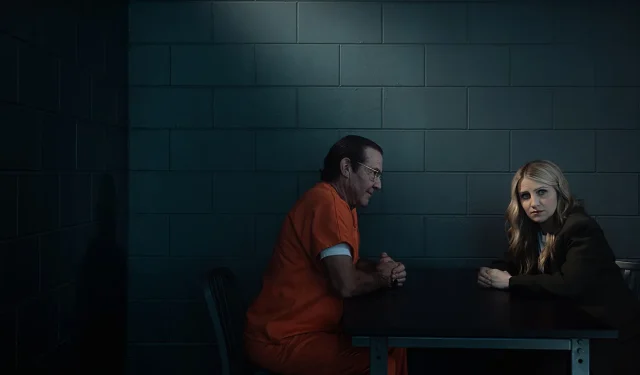Critical Overview of Paramount+’s *Happy Face*
Paramount+’s *Happy Face* stretches out eight episodes, a duration that could have sufficed for a more focused pilot, and sets the stage for a second season that feels less crucial than the first. The series oscillates between moments of self-righteousness and glaring hypocrisy, critiquing the exploitative conventions of the true crime genre while simultaneously mirroring its most problematic aspects, ultimately providing little of value in return.
Series Concept and Inspiration
Conceived by Jennifer Cacicio, known for *Your Honor*, this show markets itself as “Inspired by a True Life Story.” The narrative revolves around Melissa Moore, who has transformed the stigma of being the daughter of a notorious serial killer into an autobiography, a podcast, and a prominent role as a crime correspondent for Dr. Phil.
The series takes Melissa’s real-life experiences and layers on an unoriginal fictional procedural plot, failing to provoke any deep reflection from its creators. Set in a damp Washington backdrop, Melissa leads a mundane life with her husband Ben (played by James Wolk), teenage daughter Hazel (Khiyla Aynne), and younger son Max (Benjamin Mackey). The story ignites when a disturbing birthday card arrives for Hazel, triggering a crisis for Melissa as it beckons memories of her father, Keith Hunter Jesperson (portrayed by Dennis Quaid), a serial killer currently serving multiple life sentences for murdering eight women.
Unraveling Family Dynamics
In a move that showcases the series’ conflicts, Melissa confronts her estranged father, demanding he stay away from her family. While she works as a makeup artist on *The Dr. Greg Show*, a flashy self-help program, she discovers that her father has contacted Dr. Greg (David Harewood). This forces her to reveal her family’s dark secret on national television, which invites inevitable stigmatization.
Handling Complicated Themes
As the plot unfolds, Keith pressures Melissa emotionally and psychologically, hinting at his alleged involvement in a ninth murder for which an innocent man (Damon Gupton’s Elijah) faces execution in Texas. This leads Melissa and her producer, Ivy (Tamera Tomakili), on a journey to uncover the truth, challenged by the chaos Keith’s presence stirs within their already fragile family structure.
Critique of True Crime Tropes
Despite its claims to differentiate itself from other true crime narratives, *Happy Face* employs the same formulaic storytelling. It attempts to satirize obsessive true crime aficionados by introducing an entourage of superficial peers who latch onto Hazel once she gains notoriety. While it critiques shows like *The Dr. Greg Show* for providing shallow resolutions to serious issues, it fails to escape its own tendency to exploit human suffering.
Throughout its storyline, the characters frequently assert that true crime narratives wrongly glorify the killers rather than focusing on their victims. Yet, apart from Melissa, the portrayal of victims and their families remains fictionalized and lacks authenticity, as real victims go unnamed and unhonored, diluting the series’ purported intentions.
Character Development Concerns
While Melissa Moore’s story is compelling, the series relies heavily on mediocre subplots involving her family, such as her husband’s mundane professional dilemmas and Hazel’s trivial concerns. These elements merely distract from the weightiness of the underlying themes of trauma and responsibility associated with being the child of a serial killer.
Performance Highlights
Ashford effectively portrays Melissa’s complex emotional landscape, while Quaid embodies the manipulative aspects of Keith Jesperson, although the series grapples with how to portray him without glamorizing his actions. Harewood delivers a noteworthy performance that underscores the superficiality of reality television. Unfortunately, the series lacks substantive depth, leaving many performances underutilized, such as Wolk’s portrayal of Ben.
Conclusion: A Flawed Concept
The core issue with *Happy Face* lies in its concept and execution. It vacillates between genres, attempting to blend elements of procedural crime dramas and true crime narratives without fully committing to either path. The result is a confused narrative that could resemble other shows, such as *Fox’s Prodigal Son*, but lacks the targeted focus to truly resonate with audiences.


